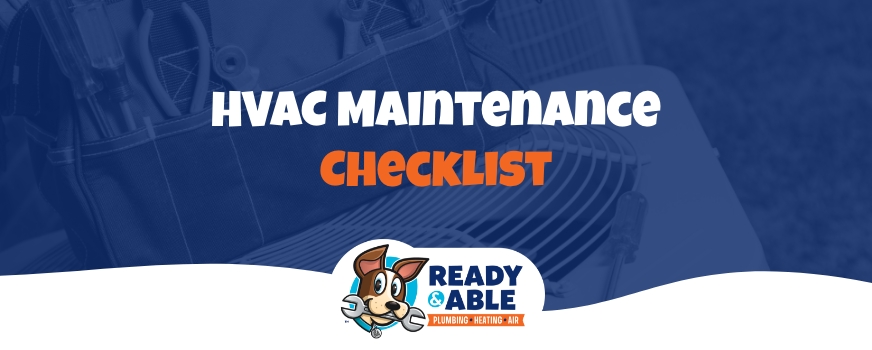Welcome to Ready & Able, formerly known as David LeRoy Plumbing! Although our name and brand have changed, we are still here to serve you and all of your plumbing, heating, cooling, and air quality needs!



Do you need to have an HVAC system maintenance check? After all, you might have a system that’s only a year or two old. And even if your HVAC system is several years old, it seems to be running just fine.
HVAC systems, however, do need regular maintenance. Think of it this way. Imagine you bought a brand-new car. You spent a lot of money on it. Would you ignore regular checkups and all the service maintenance required? Probably not. If your vehicle is older and you want to keep it on the road and working efficiently longer, regular maintenance and checkups are musts.
It’s the same with an HVAC system. If you invested in a newer heating or cooling unit, you want to make sure it’s working efficiently, and that you’re getting value for the money you paid for it. If your HVAC system is nearing the end of its 10- to 15-year average lifespan, but you have no plans to buy a newer one, it is essential to get your older system serviced regularly.
When you sign up for a regular maintenance agreement with Ready & Able, Heating and Cooling, you’re making a wise decision. Maintenance plans not only provide some immediate benefits, but also reduce the likelihood of any future problems developing. Everyone wants to make sure their HVAC system keeps them cool in the summer and warm in the winter. A regular maintenance plan will help ensure that outcome.
Here are some of the tangible benefits involved in a regular maintenance plan.
1. Lower Energy Bills
A poorly maintained HVAC system results in higher energy bills. If the system is not running at its peak efficiency, it will take more and more energy to heat or cool your home to the level at which you feel comfortable. To use our car analogy again, regular maintenance on your automobile results in improved gas mileage. Planned upkeep on your HVAC system means lower energy costs because a well-maintained system reduces energy usage.
2. Fewer Repair Bills
All HVAC systems, even the very best ones, will occasionally have problems. Regular maintenance, however, means fewer repair problems because your HVAC technician will spot them ahead of time. It makes much more sense to replace a frame belt or faulty evaporator before they cause severe problems and costly repairs. Regular maintenance gives an HVAC technician an opportunity to spot these potential issues.
3. Avoid Catastrophes
It’s a warmer-than-usual summer night, and you’ve got friends coming over for dinner. Or, perhaps it’s the middle of winter, and you’ve been planning a family get-together for weeks. The very last thing you want is for your HVAC system to break down. You should be able to rely on your HVAC system to work at peak efficiency when you need it the most. A regular maintenance plan reduces the chances of a catastrophic failure. It is also a savvy financial decision. The cost of a proper maintenance plan reduces the likelihood that you pay much more for an emergency fix.
4. Equipment Lasts Longer
Returning to our car analogy, one of the reasons you perform regular maintenance on your car is that you want it to last a long time and give you the best return on your investment. It’s the same with HVAC systems. You don’t want to have to replace yours every three or four years because you neglected maintenance and had a breakdown related to preventable wear and tear. A regular maintenance plan keeps your equipment lasting longer and reduces the likelihood you will need to buy a new HVAC system before you have gotten the most out of an older one.
5. Better Air Quality
Your entire family will breathe easier when you remove mold and dust from the air. Indoor air quality is particularly vital if anyone in your family has asthma or allergies.
6. Keeping Your Family Safe
If an HVAC system has a problem, it not only may result in costly repairs, but it could also endanger your family. In the event of a short circuit, there’s always the possibility of a fire. If you have two units for your heating and cooling needs — an air conditioner for the summer and a furnace for the winter — if a problem develops with the furnace, there’s a risk of problems with carbon monoxide. A regular maintenance plan keeps your HVAC system running smoothly and offers greater protection for your family.
If you have one unit that both cools and heats your home, you should plan on a maintenance check twice a year, in the spring and again in the fall, before you switch the systems over from one use to the other. If you have a separate system for cooling your home, you should have someone look at it in the spring, while fall is the best time to have your furnace checked.
The kind of regular maintenance plan you need will depend on several factors:
The list above includes items that get an air conditioner up and running for warmer weather. Winter preventive maintenance can feature many similar checks, or can be entirely different, depending upon if you’re using the same system to heat and cool your home or if you have a furnace.
Remember, these items may differ based on the factors mentioned above. These lists, however, do give you an idea of what to look for in a preventive maintenance contract. Ready & Able, Heating and Cooling will make the adjustments you need to create a preventive maintenance contract for you based on your equipment, your heating and cooling needs and your budget.
While you want to ensure you have a quality HVAC technician looking over your system each spring and fall, there are some things you can do yourself to help keep your HVAC equipment operating efficiently and running smoothly throughout the year. Here are a few HVAC maintenance tips that will help keep you cool in summer and warm in the winter.
1. Use Good Filters
As we noted above, you should change your filters every 30 to 90 days. You’d be surprised how many people don’t do this. A clean filter greatly enhances the efficiency of your HVAC unit. Dirty filters mean your equipment has to work much harder to keep your home at the temperature you desire. Buying a new filter every month might seem expensive, but you will recoup those costs many times over in reduced energy bills.
2. Clear Debris Around Outside Units
It’s easy for debris to gather around an outside HVAC unit. Leaves fall in the autumn, pollen blows around in the spring and before you know it, there are all manner of items building up around your HVAC unit. Check the outdoor unit regularly and make sure there are at least two feet of clearance around any air conditioning unit or HVAC heat pump. That means removing leaves, twigs, dirt and pollen from around or on top of the unit. And when you’re cutting grass in the summer, make sure the lawnmower doesn’t throw the clippings onto the unit.
3. Check Refrigerant Lines Monthly
Refrigerant lines that come from your HVAC unit into your home are what ensure you have the heating or the cooling you need. If those lines get worn, develop leaks or become detached, you won’t get the comfortable temperatures you and your family want. Even in the winter, check these lines at least once a month.
4. Keep Your Unit Level
If you want your HVAC system to work correctly, you need to ensure it’s level and not tilted. So, every two or three months, make sure your unit is level on the ground. If you have placed your system on pads, inspect to make sure they haven’t moved.
5. Eliminate Clogs
Here is an excellent do-it-yourself hack that prevents a buildup of mold and algae clogged in your system. Once a year, mix bleach with one cup of water, and pour it down the air conditioner condenser drain to clean out any buildup.
6. In Summer, Turn off Water Supplied to Your Furnace’s Humidifier
There is no reason to keep a humidifier running in summer. When the weather starts to cool in late summer or early fall, and you’re thinking about turning on the heat, install a new filter and set your humidistat to around 40 percent humidity. Then, turn on the water supply.
7. Don’t Shut Too Many Registers
You never want to shut more than about 20 percent of your home’s registers. If you do, you will put an unnecessary burden on your system by forcing it to work harder to give you the level of heat or cooling you want.
8. If Your Unit Is Indoors, Beware of Odors and Noises
When you start your unit, note the presence of any unusual odors or out-of-the-ordinary sounds. They could be indications of more severe problems.
9. Inspect Fan Blades
It’s not that you should replace faulty fan blades — leave that to the HVAC technician doing your preventive maintenance check — but look at the blades every couple of months, both when they’re in motion and when they are stationary, for signs of damage and wear.
10. Check Your Home’s Carbon Monoxide Detector
It’s a good idea to replace the batteries in your carbon monoxide detector at the same time you replace the batteries in your home’s smoke alarm. Often your carbon monoxide detector and your fire alarm are the same unit, so you only need to replace one set of batteries every six months.
Those are some of the things you can do to ensure your HVAC system is working properly. If you notice any particular problems, you can point them out to your HVAC technician when they arrive to do your spring or fall preventive maintenance check.
Meanwhile, here are a couple of other things you can do to help keep your energy bills down.
When you choose our licensed, family-owned company for your HVAC preventive maintenance, we can help you keep your system functioning at optimal levels. Ask us about our preferred customer maintenance program, discounts for veterans and senior citizens and the other benefits we offer.
You can expect same-day service and timely repairs. All our pricing is upfront, so you’ll always know what a repair costs. We also offer 24/7 emergency repairs, and you’ll get a two-year warranty on labor.
Whether you live in Harrisburg, York, Hershey or any of the surrounding communities, with Ready & Able, Heating and Cooling, you’ll experience improved energy efficiency, financial savings and the comfort of knowing your heating and cooling systems will be there when you need them.
You can speak today to one of our experienced team members to learn more about our maintenance agreement. Call us at 717-963-2034 or complete our online contact form.
Welcome to Ready & Able, formerly known as David LeRoy Plumbing! Although our name and brand have changed, we are still here to serve you and all of your plumbing, heating, cooling, and air quality needs!